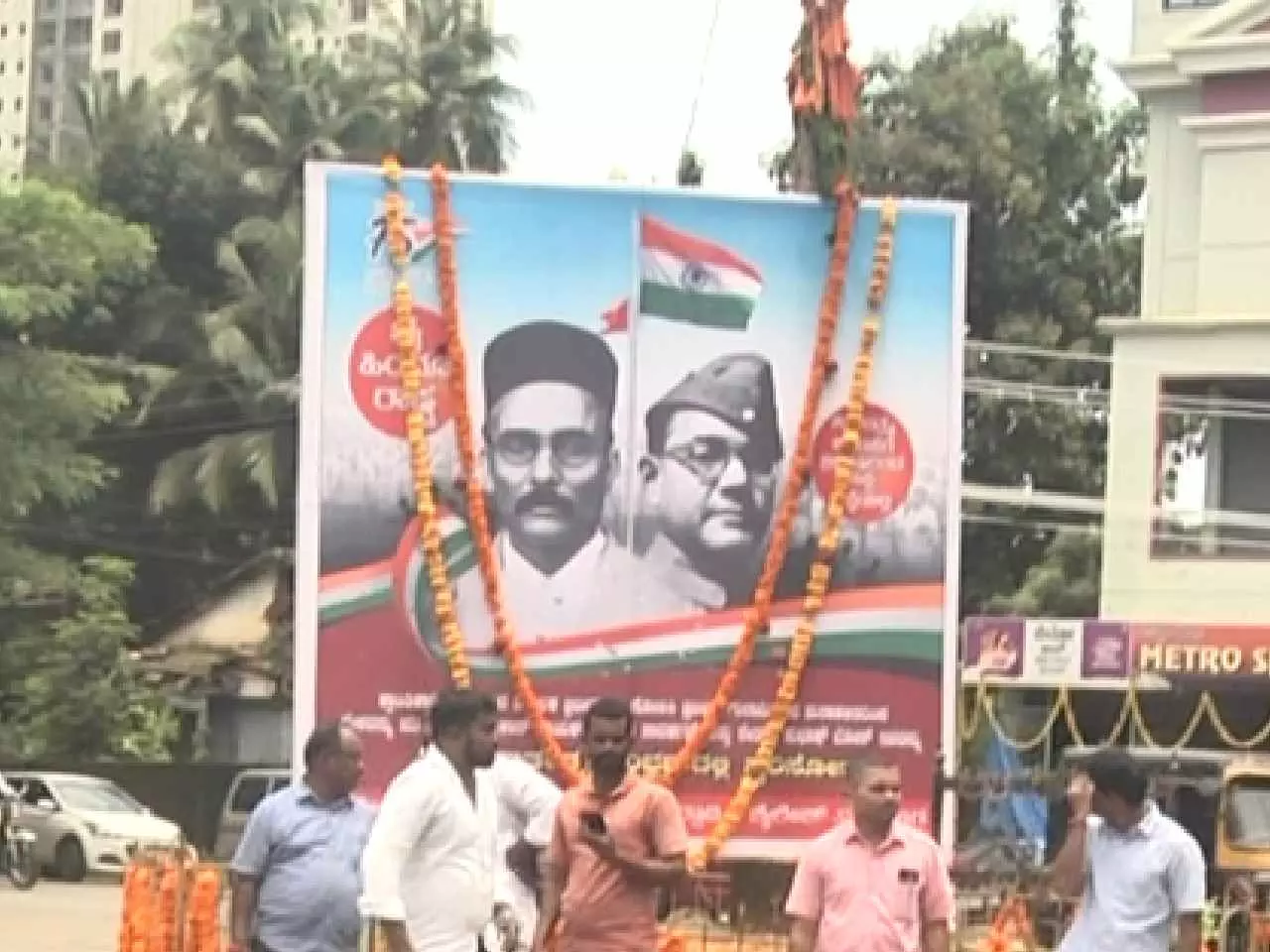


Akhilesh Yadav, leader of Samajwadi Party and former chief minister of Uttar Pradesh, defied barricades set up by the BJP government and paid tribute to Jayaprakash Narayan on his birth anniversary. Yadav also called on Bihar's chief minister to withdraw support from the NDA and criticized the BJP for trying to block their celebrations at the JP International Centre. Despite the obstacles, Yadav and hundreds of party workers stood on the road to honor the socialist leader known as the "Jan Nayak," highlighting the ongoing political tension.
Political Tension Flares in Uttar Pradesh as Akhilesh Yadav Defies BJP Barriers
In a recent political standoff, Akhilesh Yadav, leader of the Samajwadi Party and former chief minister of Uttar Pradesh, defied barricades set up by the ruling BJP government and paid tribute to socialist leader Jayaprakash Narayan on his birth anniversary. The incident has heightened political tensions in the state, highlighting the ongoing clashes between the two parties.
Background:
The Samajwadi Party and the BJP have been engaged in a long-standing rivalry in Uttar Pradesh, with the BJP emerging victorious in the 2017 and 2022 state elections. Both parties have accused each other of corruption, authoritarianism, and attempts to undermine the state's constitutional values.
Tribute to Jayaprakash Narayan:
On October 11, the birth anniversary of Jayaprakash Narayan, a prominent socialist leader known as the "Jan Nayak," Akhilesh Yadav led a group of party workers to the JP International Centre in New Delhi to pay tribute. However, the BJP government had set up barricades around the center, allegedly to prevent the Samajwadi Party from organizing a rally.
Despite the obstacles, Yadav and hundreds of party members stood on the road, garlanding Narayan's statue and paying their respects. Yadav accused the BJP of trying to "stifle dissent" and criticized the Bihar chief minister for not withdrawing support from the BJP-led NDA.
Political Polarization:
The incident has further polarized the political landscape in Uttar Pradesh. The Samajwadi Party has condemned the BJP's actions as "undemocratic," while the BJP has accused Yadav of trying to create chaos and disturb public order.
Top 5 FAQs and Answers
1. Who is Jayaprakash Narayan? Jayaprakash Narayan was a renowned socialist leader and prominent figure in India's independence movement. He was known as the "Jan Nayak" (People's Leader) for his advocacy of nonviolent resistance and commitment to social justice.
2. What was the significance of the tribute paid by Akhilesh Yadav? Jayaprakash Narayan was a revered figure in the Samajwadi Party, which traces its roots to the socialist movement. Yadav's tribute was seen as a symbolic gesture of defiance against the BJP and an assertion of the party's ideology.
3. Why did the BJP block the Samajwadi Party's rally? The BJP has stated that it had concerns about public order and potential traffic disruptions if the Samajwadi Party were allowed to hold a large rally at the JP International Centre.
4. What are the broader implications of the incident? The incident highlights the ongoing political tension between the Samajwadi Party and the BJP in Uttar Pradesh. It also raises concerns about the freedom of assembly and expression in the state.
5. How is the situation expected to develop? It remains to be seen how the incident will impact the future political dynamics in Uttar Pradesh. Both the Samajwadi Party and the BJP are likely to continue their rivalry, with further confrontations and clashes possible in the coming months.

On the occasion of Vijay Diwas, a day commemorating India's 1971 victory over Pakistan, Rahul Gandhi, Leader of Opposition in Lok Sabha, paid his respects to the brave soldiers who showed indomitable courage, leading to the liberation of East Pakistan and the formation of Bangladesh. The date also marks the surrender of 93,000 Pakistani soldiers to the Indian Armed Forces and is a tribute to the bravery and sacrifice of Indian soldiers. Congress National President Mallikarjun Kharge also highlighted the 1971 victory as a great example of humanity and justice under the leadership of then Prime Minister Indira Gandhi.

Senior Congress leaders respond to Delhi court's refusal to take ED's chargesheet in the National Herald-Young Indian case, emphasizing the lack of evidence and foundation of the case. They accuse the BJP of exaggeration and targeting the opposition, claiming that the ruling has validated their long-held belief that the case is politically motivated. Congress leader Abhishek Manu Singhvi highlights the legality and commonality of corporate restructuring, while Congress general secretary K.C. Venugopal condemns the Modi government's targeting of Sonia Gandhi and Rahul Gandhi without any legal basis.

The Congress party declared a moral and legal triumph after the Delhi court dismissed the Enforcement Directorate's chargesheet in the National Herald-Young Indian case. The judge noted that the chargesheet was based on a private complaint rather than an FIR, making it legally inadmissible. The Congress accused the Modi government of maliciously targeting its leaders and misusing central agencies for political gain. They vowed to continue fighting for truth and democratic rights, asserting that nothing could deter them from their mission.

India commemorates Vijay Diwas every year on December 16 to honour the soldiers who sacrificed their lives during the 1971 war with Pakistan, which resulted in the creation of Bangladesh. As part of this year's celebrations, the Indian Army displayed a reconstructed Turkish armed drone, Yiiha, which was shot down by India during Operation Sindoor on May 10. The Kamikaze class of drones, also known as "suicide drones," were used by Pakistan to target Indian military and civilian installations, but were almost all destroyed by the Indian military.

India celebrates the 54th Vijay Diwas, honoring the bravery and sacrifice of its soldiers in the 1971 war that led to the liberation of Bangladesh. Political leaders, including Prime Minister Narendra Modi and President Droupadi Murmu, pay glowing tributes to the armed forces and their unmatched courage. The Army marks the occasion by recalling the historic triumph and the flawless coordination between different branches of the military, with an impressive Military Tattoo in Kolkata.

Renowned spiritual leader and former BJP MP, Ram Vilas Vedanti, passed away at the age of 67 due to a heart attack. Known for his significant role in the Ram Janmabhoomi movement, Vedanti had been admitted to a hospital in Rewa for a blood infection and low blood pressure. Attempts to transport him to a better medical facility were unsuccessful due to bad weather. Political leaders, including Uttar Pradesh Chief Minister Yogi Adityanath, expressed their condolences and praised Vedanti's contributions to society.

Indian Ambassador to the United Nations, Harish P, slammed Pakistan for misusing international platforms for its hostile agenda against India at the UNSC Open Debate on “Leadership for Peace”. He objected to Pakistan’s reference to Jammu and Kashmir and questioned its democratic credentials while reaffirming India’s stance on cross-border terrorism. This reflects the ongoing strain in India-Pakistan relations and New Delhi’s determination to counter any attempt by Islamabad to internationalise bilateral disputes.

As Delhi's air quality reached hazardous levels with an AQI of 500, the city saw 228 flight cancellations and over 400 diversions. In response, the regional government ordered all schools up to Class 5 to shift to online classes. The severity of the situation has also prompted advisories from the Singapore High Commission for its nationals living in Delhi and NCR to stay indoors and wear masks when going out.

A fierce gunfight broke out between security forces and terrorists in a remote village in Jammu and Kashmir, resulting in the death of a policeman and injuries to a terrorist. The encounter was based on specific intelligence inputs, and the terrorists are believed to be affiliated with the Pakistan-based Jaish-e-Mohammad outfit. Despite facing difficulties due to darkness and rough terrain, security forces continue efforts to neutralize the remaining terrorists as the operation has been suspended for the night and will resume at first light on Tuesday. With high alerts in place, the area has been cordoned off to prevent any further attempts by the terrorists to escape.

Controversy swirls around Bihar Chief Minister Nitish Kumar as a video goes viral of him attempting to remove the hijab of a Muslim woman doctor during an appointment letter distribution ceremony. The incident has been met with widespread outrage and criticism from opposition parties, with calls for Kumar's resignation. Shiv Sena UBT leader Priyanka Chaturvedi has also condemned the act, calling it a "public harassment." This incident raises concerns about safety and respect for women in the state of Bihar.